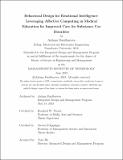Behavioral Design for Emotional Intelligence: Leveraging Affective Computing in Medical Education for Improved Care for Substance Use Disorders
Author(s)
Daulbayeva, Aidana
DownloadThesis PDF (3.555Mb)
Advisor
Picard, Rosalind W.
Terms of use
Metadata
Show full item recordAbstract
The rise in opioid use has led to a significant increase in overdose deaths since 1999. Negative attitudes and stigma from doctors towards opioid patients can exacerbate the situation, resulting in under treatment, poor communication, and labeling. Stigma can also be expressed through one's affective states, where facial expressions may unintentionally convey negative emotions or judgments.
To address this issue, this thesis aims to introduce medical trainees to Medship, an affective computing tool that promotes self-reflection about one’s facial expression and raises awareness about stigma, while also filling the gap in medical training. The focus is on changing human behavior without triggering the backfire effect on busy physicians. This will be accomplished by combining theories of behavioral design and using affective computing as a backbone for creating the app.
The Medship project is a joint effort between the Affective Computing group at the MIT Media Lab and Cornell Weill Medicine, with funding support from the Foundation for Opioid Response Efforts. The ultimate goal is to integrate this project into the medical student curriculum and eventually improve the quality of care for substance use disorder patients.
Date issued
2023-06Department
System Design and Management Program.Publisher
Massachusetts Institute of Technology